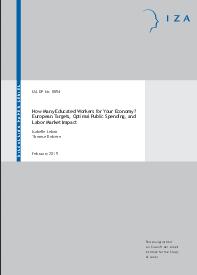Claeys, G., Leandro, A. & Mandra, A. (2015) “European Central Bank quantitative easing: the detailed manual“, Bruegel Institute, 11 Μαρτίου. The European quantitative easing programme, the Public Sector Purchase Programme (PSPP), started on 9 March 2015 and will last at least until September 2016. Purchases will be composed of sovereign bonds and securities from European institutions and national agencies. The European Central Bank Governing Council imposed limits to ensure …Read More
The fiscal effects of work-related tax expenditures in Europe
Barrios, S., Fatica, S., Martinez, D. & Mourre, G. (2015) “The fiscal effects of work-related tax expenditures in Europe“, European Economy. Economic Papers, Νο. 545. February: Brussels. Work-related tax incentives can have a significant effect on how much, if at all, certain individuals decide to work. This paper examines the fiscal impacts and associated welfare costs of reforms to such tax relief measures in five European countries, France, Spain, …Read More
Searching for the EMU core member countries
Basse, T. (2015) “Searching for the EMU core member countries“, European Journal of Political Economy, Vol. 34, Supplement, Ιούνιος 2014, pp. S32–S39. This study uses techniques of cointegration analysis and tests for structural change to search for changes to sovereign credit risk in some relevant member states of the European Monetary Union (EMU) trying to identify core countries. While there are a number of core countries the empirical findings …Read More
Macroprudential spillovers: The role of organisational structure
Danisewicz, Ρ., Reinhardt, D. & Sowerbutts, R. (2015) “Macroprudential spillovers: The role of organisational structure“, VoxEU Organisation, 05 Μαρτίου. In a global financial system, macroprudential policies may create international spillovers. This column presents new evidence on how the organisational structure of a bank affects the magnitude of these spillovers. An increase in capital requirements at home causes foreign branches to reduce their lending growth to other banks operating in …Read More
How Many Educated Workers for Your Economy? European Targets, Optimal Public Spending, and Labor Market Impact
Lebon, Ι. & Rebière, Τ. (2015) “How Many Educated Workers for Your Economy? European Targets, Optimal Public Spending, and Labor Market Impact“, IZA DP No. 8854, Φεβρουάριος. This paper studies optimal taxation schemes for education in a search-matching model where the labor market is divided between a high-skill and a low-skill sector. Two public policy targets –maximizing the global employment level and optimizing the social surplus– are studied according …Read More
A Global Projection Model for Euro Area Large Economies
Jakab, Ζ., Lukyantsau, Ρ. & Wang, S. (2015) “A Global Projection Model for Euro Area Large Economies“, IMF Publications, Working Paper No. 15/50 The GPM project is designed to improve the toolkit for studying both own-country and cross-country linkages. This paper creates a special version of GPM that includes the four largest Euro Area (EA) countries. The EA countries are more vulnerable to domestic and external demand shocks because …Read More
Corporate Taxation in Europe: Let’s get it together!
De Groen, P. W. (2015) “Corporate Taxation in Europe: Let’s get it together!“, Financial Markets, CEPS Commentaries, 16 Φεβρουαρίου More comprehensive cooperation in corporate taxation at European level could significantly advance the region’s socio-economic prosperity, but its potential contribution is unfortunately overlooked in the current search for growth and job creation. Lucrative tax niches established in some member states and the fear of losing fiscal autonomy prevent several countries from …Read More
Capital taxation in the 21st century
Auerbach, J. A. & Hassett, K. (2015) “Capital taxation in the 21st century“, VoxEU Organisation, 03 Μαρτίου. Piketty’s justification for his proposed wealth tax relies on the notion that the rate of return on capital exceeds economic growth. This column challenges this basis, arguing that it fails to account for risk. The authors also examine the relative merits of a consumption tax, which may be more valid. In Capital …Read More
Politics and investment: Examining the territorial allocation of public investment in Greece
Rodríguez-Pose, Α., Psycharis, Υ. & Tselios, V. (2015) “Politics and investment: Examining the territorial allocation of public investment in Greece“, VoxEU Organisation, 03 Μαρτίου. Electoral results and the geographical allocation of public investment in Greece have been intimately related. This column describes how incumbent Greek governments between 1975 and 2009 tended to reward those constituencies returning them to office. Increases in both the absolute and relative electoral returns for …Read More
Credit supply and the housing boom
Justiniano, A., Primiceri, G. & Tambalotti, A. (2015) “Credit supply and the housing boom“, VoxEU Organisation, 27 Φεβρουαρίου. There is no consensus among economists on the forces that drove the historical rise of US house prices and household debt that preceded the Global Crisis. In this column, the authors argue that the fundamental factor behind that boom was an increase in the supply of mortgage credit. This rise was …Read More





